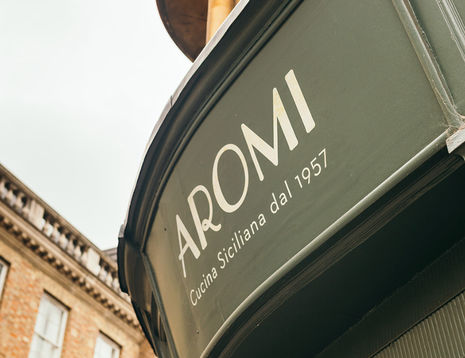Smelling the difference: in conversation with Aromi
Alex Corbould sits down with Francesco Genovese, co-director of Aromi, to discuss its authenticity, history, and pineapple on pizza

It was a dreary day when I walked through a dull industrial estate to meet Francesco Genovese, one of the directors of the popular Italian restaurant Aromi. As I sat waiting for him, a plate of chocolate biscotti was brought in.
When Genovese arrived, he asked why I wanted to interview him. I explained how popular Aromi is amongst students and observed that many people walking past their restaurant on Bene’t Street are enticed by the scent which filters out onto the street. Immediately, he noted that Aromi’s philosophy around food is that you can always “smell the difference”, anticipating one of the questions I’d planned to ask.
Genovese felt that everything in Cambridge was “chain-related” before Aromi’s 2013 opening. For him, people appreciate Aromi so much because they can smell fresh ingredients and sense that the quality of the food is much better than the mass-produced offerings of many places. Aromi doesn’t scrimp on ingredients either. He attributes much of its popularity to this, noting that customers “reward us after 12 years” because they know costs are not being cut and the standard of the food lowered.
“Just like smell, authenticity is uncompromisable for Genovese”
Just like smell, authenticity is uncompromisable for Genovese. Aromi does not “pretend” to be something it is not, its management “sticks to what we do”. This is why it doesn’t offer “bacon and eggs for breakfast”, preferring to follow “to the letter” the recipes used in its sister restaurant in Sicily, Caffè Cipriani, since 1957. Even though it has presented many challenges since Brexit, they even buy in Sicilian sea salt, as it ensures that their taste is “unique”. Of course, though, he tells me, Sicilian food is actually incredibly diverse, varying even from family to family. This regional authenticity only adds to Aromi’s charm.
Talking to Genovese, you get the impression he has been in the food industry his whole life. Yet, this is not the case; he used to be the head of recruitment for a video game company in Cambridge. Surprisingly, it was there that he got the inspiration to open Aromi. Often asked for recommendations, he eventually noticed a gap in the Cambridge market for authentic Italian cuisine which he wanted to fill. It proved easier said than done.
“He used to be the head of recruitment for a video game company in Cambridge”
Back in 2013, restauranteering was a “very closed industry”. Because one generally needed to have “a name” or a “connection”, the co-founders of Aromi “almost abandoned the idea”. It was only with the help of one agent who had faith in them that allowed them to secure a central location. Now that they had a foot in the door, his phone would not stop ringing with offers of new shops, he wryly observes. Indeed, he confides, they’re planning on expanding beyond Cambridge, though he can’t yet tell me where.
Aromi employs 85 people, who make up a “fantastic family”. That, he says, is what really motivated the team to adapt to survive during the pandemic, they wanted to make sure their “family was okay”. Staff are not just “numbers” to Genovese, and it is abundantly clear how much he cares for them.
Before I leave, I pose a few light-hearted questions: gelato, pizza, or coffee? “Gelato, but don’t tell the other children,” he says. What does he wish people ordered more? The cipollina: a Sicilian pastry filled with onions, tomato sauce, mozzarella, and ham. Sadly, though, it is no longer on the restaurant’s menu. It just wasn’t bought enough.
One final question: pineapple on pizza? “Interview over,” he says. In Italy, “you’d go to jail straight away”.
 News / Colleges charge different rents for the same Castle Street accommodation2 March 2026
News / Colleges charge different rents for the same Castle Street accommodation2 March 2026 News / King’s hosts open iftar for Ramadan3 March 2026
News / King’s hosts open iftar for Ramadan3 March 2026 Theatre / Lunatics and leisure centres 4 March 2026
Theatre / Lunatics and leisure centres 4 March 2026 News / Angela Merkel among Cambridge honorary degree nominees27 February 2026
News / Angela Merkel among Cambridge honorary degree nominees27 February 2026 News / News in Brief: waterworks, wine woes, and workplace wins 1 March 2026
News / News in Brief: waterworks, wine woes, and workplace wins 1 March 2026








